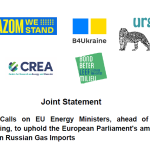
Written by Ismael Morales, Head of Climate Policy at Fundación Renovables
The title of this article is the mandate that Ursula Von der Leyen has given to Teresa Ribera, who’ll be, if everything goes according to plan, the new Executive Vice-President for a Clean, Just and Competitive Transition. However, I would add “Making Europe faster, easier and fairer for all”, something that depends largely on the new functions of the vice-president. Teresa Ribera and her team, in light of her achievements in Spain, have more than enough capacity to exercise and develop the different lines that I’ll explain below, as long as she doesn’t encounter the stagnant resistance of the most traditional and conservative sectors of the European right.
Reading the Mission Letter, we couldn’t agree more on the priorities to be carried out in the next EU cycle (2024-2029). Teresa Ribera faces a monumental challenge, with a focus on achieving a Clean, Just and Competitive Transition. With the now agreed European Green Deal, her mission will be focused on consolidating a decarbonized Europe prepared to compete globally, without leaving any citizen or sector behind.
One of the pillars of her strategy will be the reduction of energy prices (hopefully prioritizing electricity) and the progressive elimination of Europe’s dependence on fossil fuels, a key aspect to protect citizens from the volatility of energy markets. This will also include the fight against energy poverty. At this point, Fundación Renovables (Spanish energy think tank) will continue to defend the need to implement a deep reform of the electricity market: the recent reform only entails some example of measures such as auctions, Contract for Difference (CfDs), Purchasing Power Agreements (PPAs), but it doesn’t eliminate electricity prices volatility, both upward and downward, which undermines the income of renewables and slows down investment. Reducing volatility in the electricity market is necessary.
A competing EU with respect for the environment at the heart
At the heart of her mandate is the modernization of EU competition policy , a crucial aspect to ensure that Europe is able to innovate and compete globally in a market increasingly dominated by technology and sustainable supply chains, while avoiding monopolistic firms and protecting workers and consumers. Ribera will seek to establish a new framework for state aid, designed to accelerate the industrial transition towards decarbonization, circularity and greater respect for labour rights.
Another key aspect of Ribera’s mandate is her commitment to administrative simplification and the reduction of regulatory barriers, not coming at the expense of environmental regulation. On this she will cooperate with Commissioner-designate Dombrovskis. This approach seeks to alleviate the barriers that many companies, especially small and medium-sized ones, face in complying with European legislation. Her goal will be to reduce reporting obligations by at least 25%, with an even more ambitious target of 35% for SMEs.
This, however, should never come at the expense of social and environmental standards and the question of the administrative capacity of public authorities should also be addressed, for example to carry out environmental impact assessments, spatial planning, ensure effective participation in the design and monitoring of EU-funded energy projects, etc.
Ribera’s path to climate neutrality
Ribera’s big commitment to a green Europe also includes a strong social component. As part of her mandate, she will lead investment through mechanisms such as the Just Transition Fund and the Social Climate Fund , ensuring that the sectors and regions most affected by industrial and energy transformation are accompanied in this transition. Throughout her mandate, Ribera will also play a crucial role to help Member States to achieve the climate goals for 2030, and beyond, leading the creation of a framework that will allow Europe to achieve emissions neutrality latest by 2050. With a focus on reducing emissions by 90% by 2040 , the transition won’t only be quick, but also profound, covering all sectors of the economy.
In short, Teresa Ribera is called to lead an unprecedented transformation in Europe, where competitiveness, justice and sustainability converge to shape a cleaner and more equitable future. The problem is how these policies are going to be applied in national and regional regulatory frameworks as Europe is neither uniform , nor a single block. Europe is very diverse from a cultural and socioeconomic perspective along both north-south and east-west axes. Socio-economic disparities persist in some regions and a growing number of regions risk struggling with new challenges such as climate change.
There is also a disconnect of society with the different vertical structures of legislative and executive power, which is increasing. This disconnect is even more pronounced in rural areas.
A Common Energy Policy
In this context, before the elections, and knowing the upcoming difficulties of continuing with the green agenda, Fundación Renovables proposed that the new Strategic Agenda 2024-2029 of the EU takes into consideration the creation of a Common Energy Policy (CEP). We have a lot at stake, to not reverse the progress made, but also the stakes are high to avoid backtracking on progress made so far, but also to go beyond national energy policies to build a common vision that will ultimately make all member states more energy secure.
With a basic CEP for all Member States, the transposition of directives and regulations will allow Europe to enhance its strategic autonomy and avoid the vulnerability it has shown in the different health and energy price crises, providing a joint response to a common challenge. We cannot ignore the urgent eradication of fossil fuels in all sectors that are now critical, such as transport, buildings and industry. The expansion of renewable technologies, the consolidation of the social license with the territories, the reform and adaptation of buildings, the improvements to transport networks and the digitalization and reinforcement of distribution networks should be accelerated.
From the CEP that we defend and propose, all these measures, already contained in different legislative tools, are considered a priority. Among them, we believe it’s a priority to develop binding electrification plans, implement green fiscal policies, direct aid towards the energy transition, industrial policies and a responsible production and consumption model based on the circular economy.
In addition, compliance and monitoring of energy directives should be strengthened, as well as improving administrative authorization procedures for technological developments while upholding the highest standards for public participation and nature protection. To unite many of these solutions, creating a European Energy Agency would mean having an agency that coordinates initiatives and supervises compliance with energy plans.
Therefore, in this new legislative period, it’s necessary to implement all the mandates of the directives in the most unified way possible, without creating more inequality between countries and regions. All member states should be able to benefit from the advantages of the energy transition, regardless of their renewable potential. Collaborate to make Europe the first climate neutral continent. There is work that needs to be done.



